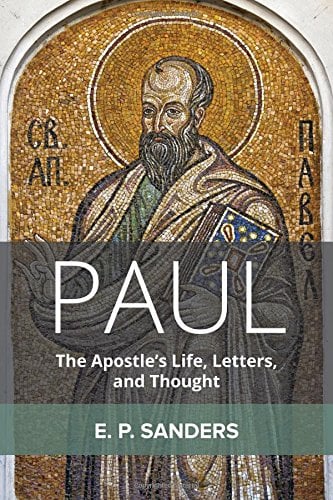p. 336— In Paul’s vice lists, notice how immorality including sexual immorality is listed together with idolatry in a list of the besetting sins of the Greco-Roman world from a Diaspora Jewish point of view [why not just from a Jewish point of view?]
In 1 Cor. 6.9-10 he translated malakoi as passive or soft males, and aresenokoitai as sodomites, whereas the NIV and NRSV translate the former term as male prostitutes.
p. 337 —Jewish vice lists tended to feature idolatry and sexual morality but vice and virtue lists were common in the Greco-Roman world, with vice lists tending to be longer than virtue lists See Gal. 5.19-23. The vice lists show that Paul was at home in the Diaspora. In the synagogue in Tarsus or elsewhere he would have heard idolatry and sexual immorality condemned in the synagogue.
“One of the most important observations about Paul’s lists of vices is that they more-or-less equate all vices and condemn the guilty in absolute terms.”
p.338— 1 Cor. 6.10 and Gal. 5.21 both state that the guilty will not inherit the Kingdom of God.
“Homiletically, vice lists gain rhetorical force partly by length and partly by the equation of relatively minor sins with major ones….The listener’s approval of the condemnation of major sins is then transferred to the condemnation of lesser sins, and all can feel that they have been suitably rebuked for their faults.” Paul is not writing systematic ethics, where one would distinguish between a lesser sin like jealousy and a major on like murder. Paul is employing a rhetorical homiletical device. “When he had to deal with a specific individual transgression, he responded quite differently.”
p. 339— Sanders notes 1 Cor. 5.1-5 where Paul says the incestuous person should be expelled from the church but he adds that he will be killed by Satan, but his spirit will be saved on judgment day— the opposite of the vice list which says he shall not inherit the kingdom. [Paul says hand him over to Satan for ‘the destruction of the flesh’ so that his spirit may be saved on judgment day’ Flesh here could mean the sinful inclinations, but Satan would not likely want to destroy that, so Sanders assumes he means the physical body by flesh]
The accusations in the vice lists are not actually directed at the current sins of his converts at all (‘and such were some of you’ he says once at 1 Cor. 6.11).
pp. 340-41– But Paul’s church members also were not idolaters or at least not all of them were [n.b. on the contrary 1 Cor. 8-10 says some of them still were!] Sanders concludes the vice lists are a general broadside against Gentile culture, not a description of Gentiles in the church. While Gentile moralists might criticize Gentiles for vices, Jewish moralist condemned them for it (see Josephus Apion 2.199). The lists were not designed to either describe the actual sins of the congregation or meet the current needs of the congregation and based on 1 Cor. 5 they do not reveal how Paul would deal with a specific case of such a sin. These are standard Jewish Diaspora critiques of such sins. Sanders adds that yes Paul really believed what he says and opposed these transgressions.
p. 342— In Rom 1 Paul shows how idolatry and immorality go together— when you exchange the worship of the true God for the false one, then one is also likely to exchange the natural for the unnatural sexual activities. The language of exchange the glory and image come from Ps.106.20. cf. Jer. 2.11. Now interestingly Paul talks about exchanging true worship for images of birds and reptiles and 4 footed animals….. but the gods of Greece and Rome were persons not animals. It was the Egyptians who had gods that were at least part animal— see the Sphinx. Probably Paul is reflecting on Deut. 4.16-19 which probably refers to some of the Egyptian deities.
p. 343— Thus Paul’s list of idols is probably traditional and came from Alexandria. When Paul talks about natural and unnatural he is referring to sexual acts that can lead to conception, and those that can’t. Rom. 1.26 then is not referring to women performing anal or oral sex. It is about homosexual activity.
p. 344— malakoi refer to passive males who receive anal intercourse. Aresenokoitai are the penetrators— the male copulators. Homosexual activities were something that Judaism and the Greco-Roman world clashed and disagreed on and Christianity simply followed Judaism’s lead on this.
p. 346— the master categories in the ancient world were not homo and heterosexual, but active and passive. “Free adult males were supposed to be the active partners in all forms of sexual expression. Female slaves and boys should be passive. Free adult males should never be the passive recipients of sexual activity; they should penetrate but never be penetrated.” No stigma in Roman thinking for any elite male to put his penis in any orifice of the body of another as long as it is a person of inferior status.
p. 347— In the Greco-Roman world it was regarded as natural for a male to desire both female and male partners. Society however expected men to make love to women and have children, which is to say “the social rules did not permit men to be exclusively homosexual”. Society did not require men to have sex with other males (partial exception in Athens see Appendix I). Greeks and Romans despised effeminacy in grown men. Boys had to reach the age of consent (11-12) before adults had sex with them, adult male free men should never be passive partners, and those who did play this role were despised, and later in the Empire, down to the 5th century free men who played the passive role were legislated against and ruthlessly punished, even with death— See E. Cantrella Bisexuality in the Ancient World, pp. 175-81. Any form of mutilation such as castration or circumcision was normally seen as abominable. In fact there was a Roman law against castration, but it was an eastern religion practice which could be on display if their was a religious procession of an eastern religion in the capital complete with eunuchs.
p. 348— to some moralists only sexual activity that might lead to procreation was according to nature (which meant sex with a pregnant woman was not natural).
p. 349— While 1 Sam. 18.1,3; 19.1 and 2 Sam. 1.26 might be interpreted as homosexual love between David and Jonathan, but that is definitely not how Jewish culture interpreted it, [especially in light of the Levitical laws which were already in place in David’s time.]
p. 350-51— It is obvious that various passages in the OT ban homosexual activity, Lev. 18.22 and Lev. 20.13 even says if a man lies with another man they both should be put to death. See Josephus’s comment on this passage in Apion 2.199. This summary not only prohibits that but on the basis of the Onan story it prohibits coitus interruptus and intercourse during menstruation and intercourse when the wife is pregnant all because intercourse is supposed to be for the purpose of producing children. “The Bible does not support Josephus’ view that husband and wife should have sex only if the woman could become pregnant.” Lev. 18.22 and 20.13 in the LXX both use arsen and koiten to describe the forbidden act. See 1 Cor. 6.9.
pp. 352-54— see Wis. Sol. 14.12 the making of idols was the beginning of porneia. 14.27—“for the worship of idols not to be named is the beginning and cause and end of every evil” Like Paul he expresses his condemnation of heathenism with a vice list. 14.26 speaks literally of interchange of genesis literally cf. Philo Cherub. 92 and Test. Naphtali 3.4. Same root as Paul’s exchange language in Rom.1.26-27. Sac. Of Abel and Cain 32 lists 146!! Vices that are the result of loving pleasure.
p. 357— in Philo’s discussion of homosexuality one of the terms he uses is paiderastein—to commit pederasty.
[One thing Sanders does not emphasize is that the condemnation of homosexuality is not a Diaspora specific thing, nor is it a Jews in Greco-Roman culture thing. Neither of those things are the source of the prohibitions in Lev. 18 and 20]. Philo in Spec. Laws 3.37-42 says a male who dresses up like a female resulting in androgynous (male-female combo) should not be allowed to live even for an hour.
p. 358— Philo even uses the word malakias— effeminate here. He says some of them have even tried to mutilate their genitals so as to turn into a woman. Plutarch was of the view that homosexual intercourse demeans the passive partner. See also On Abraham 135-36.
p. 360– Plato’s Symposium speaks of pederasty, and when a boy grew facial hair etc. he was to grow and himself become a pursuer of boys. In the Athenian ideal sex should be between the thighs and no penetration of the anus.
p. 361— as Gen. 19.4-11 indicates, here it is men desiring men, not boys which explains Philo’s interp of that passage. In short, when he discusses the Bible he discusses male on male sex, when he comes closer to talking about his own age and Greco-Roman culture he talks about pederasty. He doesn’t have a vice list that combines idolatry and sexual immorality like Paul and Wis. Sol.
pp. 362-63— Philo regards homosexuality as against nature as well as against Mosaic Law. Jewish lit. condemns all forms of homosexuality— see Letter of Aristeas 152 from about 100 B.C. The majority of men defile themselves by procuring males…. See Sybilline Or. 2.73— do not bed males (arsenkoitein)
p. 364-65— So 1 Cor. 6.9 means avoid sexually immoral people (porne) specifically catamites and sodomites. IN 1 Cor. 5.1 clearly porne cannot me prostitution, it refers to incest. Probably in 1 Cor. 7.2 probably it also means just sexual immorality in general not prostitution. But in 1 Cor. 6.13,18 it probably does refer to prostitution, see vss. 15-16. The list in 1 Cor. 6.9 then says avoid the sexually immoral (porne) and then gives the specific examples including homosexual expression, adultery etc.
p. 366— arsenkoitas is one who actively beds a man, and malakoi is his passive partner.
p. 367— Important point– arsenkoitas seems to be a specifically Jewish term going back to Leviticus LXX.
p. 368— Everyone looked down on men who were soft, but men who penetrated them were seen as acting normally in the Greco-Roman world. Malakos recently has been translated wrongly as male prostitute not a passive effeminate adult male. Philo did not call malakoi prostitutes. No one called Julius Caesar that either. Cf. Macrobius Sat. 2.3.16 where effeminatus can be called mollis— soft a term indicating delicacy, weakness etc. Cicero uses the term of his son in law because he walks in an effeminate way, and he is not calling him a prostitute or call boy. Cf. Seneca Epist. 47.7.
















